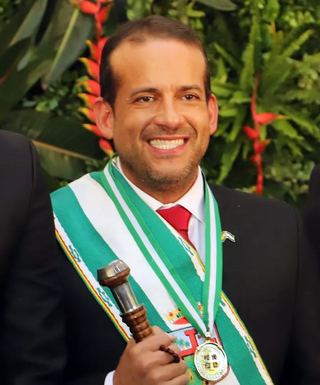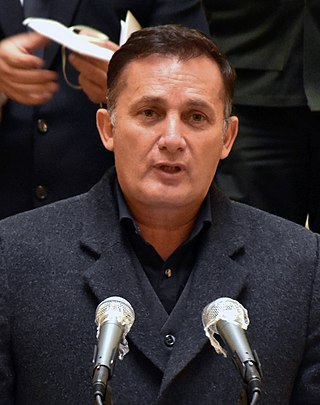The Confederation of Indigenous Peoples of Bolivia is a national representative organization of the Bolivian indigenous movement. It was founded in October 1982 in Santa Cruz de la Sierra as the Confederation of Indigenous Peoples of the Bolivian East, with the participation of representatives of four indigenous peoples of the Bolivian East: Guarani-Izoceños, Chiquitanos, Ayoreos and Guarayos.
The Vedas are part of a set of Hindu texts.

Los Perros del Mal was a Mexican Lucha libre wrestling group stable, originally competed in Consejo Mundial de Lucha Libre and in Lucha Libre AAA World Wide (AAA). The name is a play on the name of the founder of the group, Perro Aguayo Jr. It was one of the main rudo (heel) stables in CMLL until October 2008, when Aguayo along with Mr. Águila and Damián 666 left the company to form Perros del Mal Producciones. The stable is a part of the new promotion, despite its namesake. Their motto is "Dios perdona, los Perros no". The group originally started under the name La Furia del Norte but evolved into Los Perros del Mal as wrestlers not from northern Mexico joined the group.

Alberto Vázquez-Figueroa is a Spanish novelist, inventor and industrialist. His novels have sold over 25 million copies worldwide. He is the owner of A.V.F.S.L, a desalinization company that uses a method of desalinization by pressure, invented by himself.

The National Institute of Cinema and Audiovisual Arts is an agency of the Government of Argentina. It promotes the Argentine film industry by funding qualified Argentine film production companies and supporting new filmmakers. The Institute was established on 14 May 1968 by law nº 17.741. The INCAA also organizes the Mar del Plata International Film Festival, Ventana Sur film market, and has its own film school called ENERC.
Miguel Ángel Hoyos Guzmán in a Bolivian former football defender who last played for Nacional Potosí.

Equanimal was a Spanish non-profit animal rights organization, formed as a merger, in 2006, of the organisations Alternativa para la Liberación Animal and Derechos para los Animales. In 2012, it merged with the International animal rights organization Animal Equality.

The Presidency of Evo Morales began on January 22, 2006 when Evo Morales was inaugurated as the 80th President of Bolivia, following his victory in the 2005 general election, where he won 53.7% of the vote, defeating Jorge Quiroga, Samuel Doria Medina, and several other candidates. Morales increased taxation on the hydrocarbon industry to bolster social spending, emphasising projects to combat illiteracy, poverty, racism, and sexism. Vocally criticizing neoliberalism and reducing Bolivia's dependence on the World Bank and International Monetary Fund, his administration oversaw strong economic growth while following a policy termed "Evonomics" which sought to move from a liberal economic approach to a mixed economy. Scaling back U.S. influence in the country, he built relationships with leftist governments in the Latin American pink tide and signed Bolivia into the Bolivarian Alliance for the Americas. Attempting to moderate the left-indigenous activist community, his administration also opposed the right-wing autonomist demands of Bolivia's eastern provinces. Winning a recall referendum in 2008, he instituted a new constitution that established Bolivia as a plurinational state and was re-elected in 2009. His second term witnessed the continuation of leftist policies and Bolivia's joining of the Bank of the South and Community of Latin American and Caribbean States; he was again reelected in the 2014 general election. Following the disputed 2019 general election and the ensuing unrest, Morales resigned and flew to Mexico where he had been granted political asylum.

Augusto Ferrer-Dalmau Nieto is a Spanish hyperrealist painter who specialises in historical military paintings that portray different eras of the Spanish Armed Forces through hyperrealistic naturalism. On January 11, 2022, he presented the Ferrer-Dalmau Foundation with the aim of promoting defense culture through history and art.

The 2019 Bolivian protests, also known as the Pitita Revolution, were protests and marches from 21 October 2019 until late November of that year in Bolivia, in response to claims of electoral fraud in the 2019 general election of 20 October. After 11 November 2019, there were protests by supporters of the outgoing government in response to Jeanine Áñez becoming the acting president of Bolivia. The claims of fraud were made after the suspension of the preliminary vote count, in which incumbent Evo Morales was not leading by a large enough margin (10%) to avoid a runoff, and the subsequent publication of the official count, in which Morales won by just over 10%. Some international observers expressed concern over the integrity of the elections.

Jeanine Áñez Chávez is a Bolivian lawyer, politician, and television presenter who served as the 66th president of Bolivia from 2019 to 2020. A former member of the Social Democratic Movement, she previously served two terms as senator for Beni from 2015 to 2019 on behalf of the Democratic Unity coalition and from 2010 to 2014 on behalf of the National Convergence alliance. During this time, she served as second vice president of the Senate from 2015 to 2016 and in 2019 and, briefly, was president of the Senate, also in 2019. Before that, she served as a uninominal member of the Constituent Assembly from Beni, representing circumscription 61 from 2006 to 2007 on behalf of the Social Democratic Power alliance.

Luis Fernando Camacho Vaca is a Bolivian activist, businessman, lawyer, and politician serving as the 2nd governor of Santa Cruz since 2021. He is the leader of Creemos, opposition bench in the Plurinational Legislative Assembly and was the chair of the Santa Cruz Civic Committee in 2019.
The Red Ponchos are a militia mostly containing Aymara reservists of the Bolivian Army in the Andean region of Omasuyos. Their actions keep in mind their original culture, and they use Ayllu organizational forms with a communal structure, a practice that is used in Aymara and Quechua societies. They are estimated to have numbers in the thousands.

Rafael Arcángel Quispe Flores, often referred to as Tata Quispe, is a Bolivian indigenous activist and politician who served as general executive director of the Indigenous Development Fund from 2019 to 2020. He previously served as a substitute party-list member of the Chamber of Deputies from La Paz under María Eugenia Calcina from 2015 to 2019.

The COVID-19 pandemic in Bolivia was a part of the worldwide pandemic of coronavirus disease 2019 caused by severe acute respiratory syndrome coronavirus 2. The virus was confirmed to have spread to Bolivia on 10 March 2020, when its first two cases were confirmed in the departments of Oruro and Santa Cruz.

The flag of the patujú flower is a flag used in official acts of the Bolivia government, which shows Bolivia's national flower. The latter represents the indigenous peoples of Eastern Bolivia and has been used as a symbol of protest by the opponents of Evo Morales in that area of the country.

Oscar Miguel Ortiz Antelo is a Bolivian businessman and politician who served as minister of economy and public finance from July to September 2020 and as minister of productive development from May to July 2020. As a member of the Social Democratic Movement, he previously served two terms as a senator for Santa Cruz from 2015 to 2020 on behalf of the Democratic Unity coalition and from 2006 to 2010 on behalf of the Social Democratic Power alliance. Nearing the end of his second term, Ortiz was his party's presidential candidate, attaining fourth place in the annulled 2019 general elections. During his first term, he served as president of the Senate from 2008 to 2010, the last opposition legislator to preside over the upper chamber as of 2023. Outside of national politics, Ortiz served as president of the Union of Latin American Parties from 2018 to 2021 and has been the rector of the Bolivian Catholic University at Santa Cruz since 2021.

Luis Fernando López Julio is a Bolivian businessman, retired military officer, and politician who served as minister of defense from 2019 to 2020. Appointed in the tail end of the 2019 political crisis, López, along with Minister of Government Arturo Murillo, quickly became characterized as the "strong men" of the Jeanine Áñez administration and were implicated in the deadly events at Senkata and Sacaba. López was called to hearings by the Plurinational Legislative Assembly but failed to present himself three consecutive times, ultimately resulting in his censure by the legislature. As per the terms of the Constitution, he was dismissed as minister but, exploiting a loophole in the document's text, he was reappointed just a day later. Soon after, reports revealed his participation in the tear gas case, which accused the ministries of government and defense of irregularly purchasing non-lethal weapons at inflated prices.
Events from the year 2022 in Bolivia.
The following is a chronology of notable events from the year 2023 in Bolivia.














